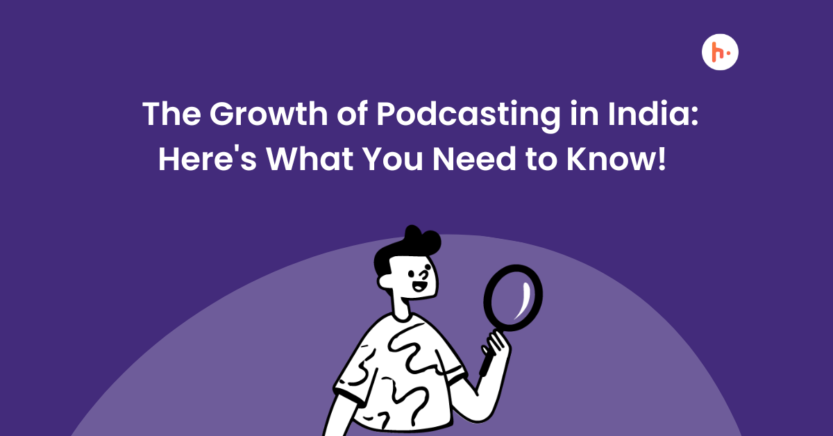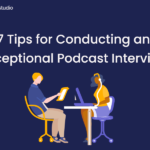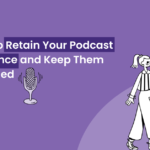India has a long history of storytelling, dating back to ancient times, where stories were passed down from generation to generation.
Don’t we all love to tell a good story? Podcasts act as the perfect medium for us to share our stories and experiences, allowing us to connect with others who share similar interests.
Over the last few years, podcasting has seen massive popularity in India, and people are becoming increasingly familiar with this concept.
But there’s still a large number of folks who don’t know the medium at all. If you are one of those people, this blog is for you.
Buckle up because we’ll be taking you on a journey through the history of podcasting, from its early beginnings to its explosive growth in popularity and everything else you need to know to fully understand and appreciate this art form.
What is a Podcast?

Imagine this: You’re stuck in traffic on your way home from work, and you’re bored out of your mind. Suddenly, you remember your favorite podcast show that you can’t wait to catch up on and unwind for the day. You pull out your phone, open a streaming app, and within seconds, you’re transported to a world of entertainment.
That’s what podcasts are; digital audio or video shows that you can stream or download on your device. It’s like a radio show but without the limitations of airwaves, which you can tune into anytime and anywhere.
The best part? There’s a podcast for everyone! Whether you’re into politics, news, romance, comedy, history, or even conspiracy theories, there’s a show out there on everything. And because you can listen to them at your own convenience, you will never have to miss an episode.
Podcast platforms like Hubhopper, Spotify, and Apple Podcasts make it super easy to access and enjoy a vast and very diverse podcast library. And if you really like a particular show or podcaster, you can even subscribe to them to get notifications whenever they roll out new episodes.
Not only that, but you can also download episodes to listen to later, perfect for when you’re on the go or without internet access.
History of Podcasting
It’s common knowledge that the term “podcast” came from a blend of two words: “iPod” and “broadcasting”! The format was initially developed for Apple’s iPod in 2004.
What many don’t know is that the idea of creating digital audio content and sharing it online dates back a decade before that. In fact, the first podcast-like recording can be traced back to 1993, when internet pioneer Carl Malamud started publishing regular audio updates on internet-related news and events.
It wasn’t until 2000, when Dave Winer, a software developer, and blogger, created RSS (Really Simple Syndication) that podcasts could be easily distributed. RSS allowed for automatic updates to be sent to subscribers and made it easier for listeners to access new content. This allowed people to make and upload podcasts, subscribe to said podcasts, and have them automatically delivered to their devices, just like new songs in their music library.

The first podcast, or the first one to use the term, is basically attributed to Adam Curry, a former MTV VJ who was also an early tech adopter. He launched a show called “The Daily Source Code” in 2004, which was essentially a personal audio diary in which he talked about his life and various interests. This helped bring the breakthrough into the field of podcasting and to popularize the concept.
Since those early days, podcasting has grown substantially, with thousands of shows and podcast streaming platforms now available on every topic imaginable. One of the reasons that podcasting has become so popular is that it’s an unconvincing flexible medium, you can listen to podcasts anytime and anywhere while performing any of your daily chores.
Growth of Podcasting in India

While the podcasting space was taking over the West by storm, it also made a notable presence in India.
The rise of mobile devices made it extremely easy for the audio medium to flourish. As more and more people started using smartphones and tablets, they were able to download and listen to podcasts on the go easily. This made it possible for people to consume audio content during their commute, while exercising, or just during downtime throughout the day.
Podcasting’s accessibility contributed a huge part to its explosive growth. Anyone can create a podcast, and it doesn’t require a lot of expensive equipment or technical expertise.
The growth of podcasting has also led to the emergence of podcast networks and production companies, which provide resources and support to podcasters. These networks not only offer a platform to showcase their talent but also help with marketing, advertising, and distribution.
These podcasting platforms have essentially changed the way people create podcasts in India. Hubhopper, for instance, provides end-to-end podcasting solutions, including hosting, creation, distribution, analytics, monetization, and promotion, all for free. The platform has a major contribution in making India become the third largest country in podcast consumption.
A look at the current podcasting space in India
A survey conducted by IVM Podcasts, an Indian podcast network, found that 77% of their listeners were under the age of 35, indicating that podcasting is particularly popular among young people in India.
The Indian podcast listeners are not only young, but they come from dynamic ethnicities and like to enjoy podcasts in various regional languages, including Hindi, Tamil, Telugu, and Marathi.
Platforms like Hubhopper, Aawaz.com, and Kuku FM offer a diverse range of podcasts catering to these diverse young podcast listeners, resulting in increasing listenership.
The most popular genres of podcasts in India are comedy, society, and culture, and news and politics, according to a report by Hubhopper, a leading podcast hosting platform.
According to a report by PwC India, the Indian podcast industry is expected to reach a market size of INR 17.8 billion (approximately USD 240 million) by 2023.
Why are Podcasts gaining popularity?

Podcasting has been gaining popularity over the past few years and has become a widely accepted medium of entertainment and education. Podcasts have become a part of our daily routine and have firmly established themselves in the world of digital content as more and more people become excited about this new medium.
Authenticity:
Podcasting has a reputation for being authentic. Podcasts often feel like genuine conversations between friends. Podcasters are known for their honesty, and listeners appreciate the personal touch that podcasts provide.
Convenience:
You can listen to podcasts at your convenience whenever and wherever you wish to. You can listen to them on your commute, while working out, or even while doing household chores. Podcasts are easily accessible, and you can listen to them anywhere and anytime.
Community:
Podcasting has created a sense of community among listeners. Podcasts often have dedicated fan bases that engage with the content and with each other. This has led to the growth of podcasting events and conferences, where fans can meet their favorite podcasters and engage with others who share their interests.
Cost-effective:
Creating a podcast is relatively easy and cost-effective. You don’t need a large budget to create a podcast. All you need is a microphone, editing software, and a hosting platform like Hubhopper where you can record, edit, upload, and distribute your podcast to 26 different platforms. This has led to a proliferation of independent podcasts and has opened up the field to a more diverse range of voices.
Diversity of Genres:
Podcasting is a diverse medium, and there is a podcast for almost any topic you can think of. From sports to politics, science to true crime, there is a podcast for everyone and everything. This diversity has made podcasting appealing to a wide range of audiences.
Less technical:
Another reason for its popularity is that it is relatively less technical than other forms of media production, such as video production or live broadcasting. To create a podcast, all you basically need is a microphone, recording software, and an internet connection to upload the finished product. This means that anyone with a basic understanding of technology can create a podcast, making it a highly accessible medium for sharing ideas and information.
Conclusion
In conclusion, podcasting has come a long way since its early days, and it is going to grow significantly in the coming years. With millions of people around the world tuning in to their favorite shows each week, podcasting has become a powerful medium for content. With the rise of smart speakers and other voice-activated devices, it’s likely that podcasting will continue to grow and evolve in the coming years. Whether you’re a casual listener or a dedicated fan, there’s no denying that podcasting has had a significant impact on the way we consume audio content in the 21st century.




